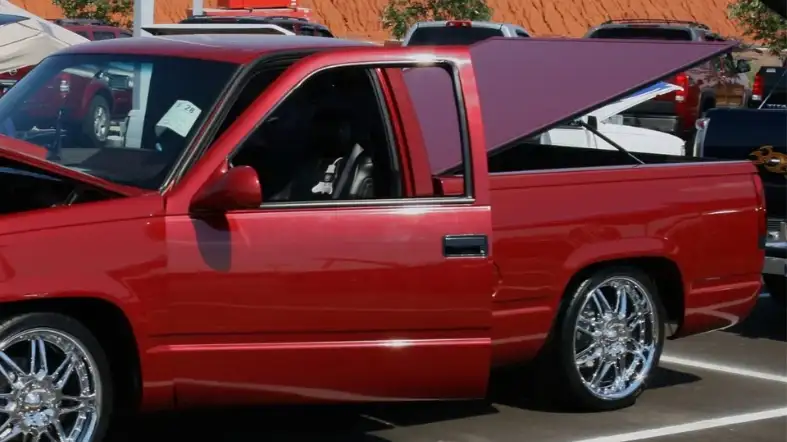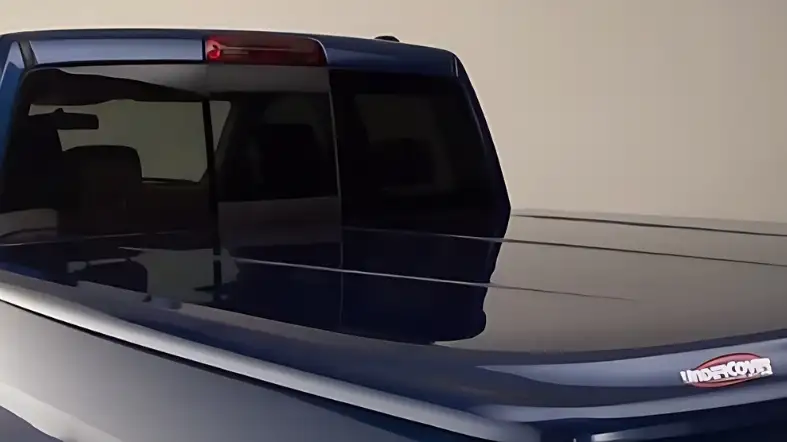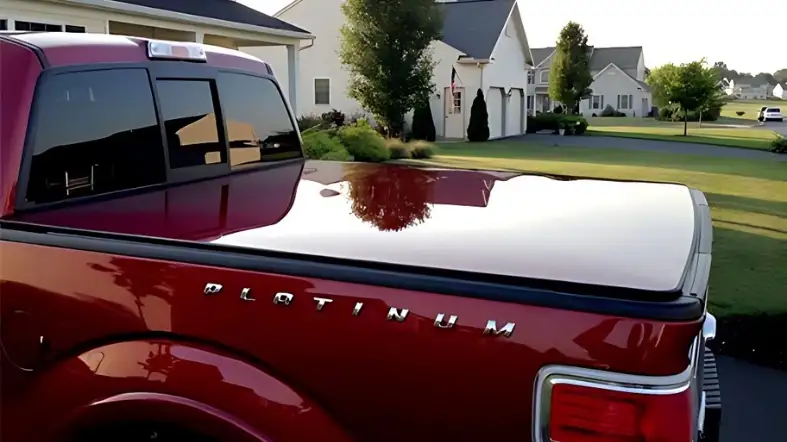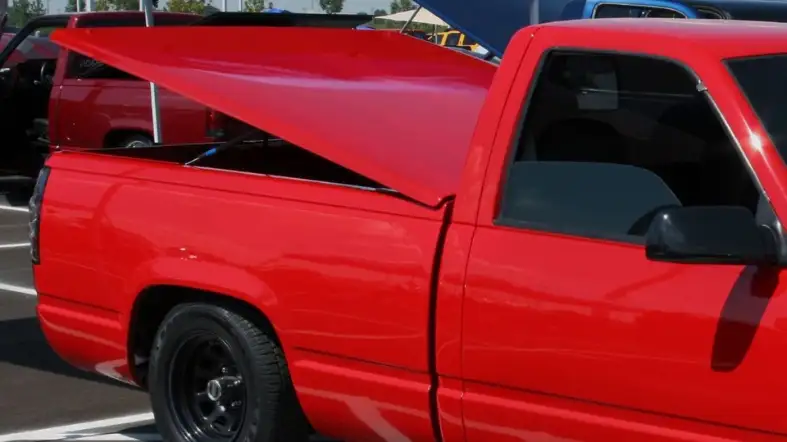How much paint will you need for your tonneau cover? The size, type, and material of the cover and your chosen paint all play a role.
To ensure accuracy, follow the 11-step process, which includes measuring, calculating surface area, and adjusting for factors like porosity.
Calculating the right amount of paint’ll save costs, prevent wastage, achieve consistent color and texture, save time, and enhance durability.

How Much Paint Do I Need To Paint A Tonneau Cover?
The amount of paint you need to paint a tonneau cover will depend on the size and type of cover and the paint you choose. A good rule of thumb is to use one quart of paint for every 10 square feet of surface area. So, if your tonneau cover is 20 square feet, you will need two quarts of paint.
Factors Affecting Paint Quantity For Tonneau Covers
Size and Shape of the Tonneau Cover
The size and shape of the tonneau cover play a significant role in determining the amount of paint required.
Larger covers will naturally require more paint to cover the entire surface area.
Similarly, tonneau covers with complex shapes or intricate designs may require additional paint to ensure proper coverage.
Material of the Tonneau Cover
Tonneau covers are made from different materials such as fiberglass, aluminum, or vinyl. The material of the cover can impact the absorption and adhesion of paint.
For example, porous materials like fiberglass may require more paint than non-porous materials like aluminum.
Color and Opacity of the Paint
The color and opacity of the paint you choose can also affect the quantity required.
Darker colors generally provide better coverage and require less paint compared to lighter colors.
Additionally, paints with higher opacity or thicker consistency may require less application for complete coverage.
Surface Preparation
Proper surface preparation is crucial for achieving good paint adhesion and coverage.
Sanding, cleaning, and applying a primer are important steps in the preparation process.
By adequately preparing the surface, you can ensure that the paint adheres well, reducing the amount of paint needed.
Application Technique
The technique used to apply the paint can impact the quantity required. Using a spray gun or airbrush minimizes paint wastage, unlike brushes or rollers.
The proper technique ensures efficient paint distribution and reduces the likelihood of overapplication.
Number of Coats
The number of paint coats applied also affects the quantity needed.
Applying multiple thin coats instead of a single thick coat can help achieve better coverage and reduce the required paint quantity.
Paint Spreading Rate
Each type of paint has a specific spreading rate, which indicates how far the paint will cover per unit of volume.
Understanding the spreading rate of the paint you choose can help estimate the quantity needed for adequate coverage.
Benefits Of Properly Calculating Paint Quantity For Tonneau Covers

Cost Savings
When you accurately figure out how much paint you need, you save money. Instead of buying too much paint that you won’t use, you can buy just the right amount.
This helps you use your money wisely and spend only what you need for your tonneau cover project.
Avoiding Wastage
Calculating the right amount of paint helps you avoid wasting it.
When you know exactly how much paint you need, you can avoid having leftovers that you throw away.
This is good for the environment and helps you use your materials efficiently.
Consistent Color and Texture
Calculating the proper amount of paint ensures that your tonneau cover looks the same.
If you don’t use enough paint, you might have spots that look different or uneven, which doesn’t look good.
But if you use too much paint, it can make your cover look thick and unnatural. By calculating the right amount of paint, you can make it look smooth and nice.
Time Efficiency
Imagine starting to paint your tonneau cover and then running out of paint in the middle. It would be frustrating and take a lot of time to stop and get more paint.
By calculating how much paint you need beforehand, you can ensure you have enough to finish the job without interruptions.
This saves you time and helps you finish the project quickly.
Improved Durability
Calculating the right amount of paint also makes your tonneau cover last longer.
If you don’t use enough paint, certain parts can get damaged by sunlight, water, and scratches.
But if you use too much paint, it can flake, crack, or peel off. By using the right amount of paint, you give your tonneau cover the best protection, making it stronger and lasting longer.
11 Steps: Calculating Paint Quantity For Tonneau Covers

Step 1: Gather the necessary tools and equipment
To begin, ensure you have the following tools and equipment ready:
- Wrench
- Ratchet
- Sandpaper
- Primer
- Paint
Step 2: Clean and detach the tonneau cover
Start by thoroughly cleaning the tonneau cover to remove any dirt, dust, or debris that may affect the paint application.
Detach the cover from the truck bed to make the painting process easier.
Step 3: Sand down the tonneau cover
Use sandpaper to sand down the tonneau cover’s surface gently.
This step helps create a smooth surface for the paint to adhere to and removes any existing paint or imperfections.
Sanding also promotes better paint adhesion and ensures a professional finish.
Step 4: Prepare the primer
Follow the instructions provided with the primer to prepare it for application.
Priming the tonneau cover helps create a stable base for the paint and enhances its durability. Ensure the primer is well mixed and ready for use.
Step 5: Apply the primer
Carefully apply the primer to the tonneau cover using a brush or roller. Ensure even coverage and smooth application.
Allow the primer to dry according to the manufacturer’s instructions.
Step 6: Calculate the surface area of the tonneau cover
To determine the paint quantity needed, you must calculate the surface area of the tonneau cover. Measure the length and width of the cover using a measuring tape.
Step 7: Measure any doors or windows on the tonneau cover
If your tonneau cover has doors or windows, measure their dimensions as well. This will allow for accurate calculations and ensure sufficient paint coverage.
Step 8: Calculate the total surface area
Using the measurements obtained in Steps 6 and 7, calculate the total surface area of the tonneau cover.
If multiple doors or windows exist, calculate their surface areas individually and add them to the total.
Step 9: Determine the paint coverage per gallon
You need 750ml for a 9-meter square tonneau cover surface. You have to apply this coat 2 times.
It required 2/4 hours to dry; wait to dry the first coat fully, then apply the second coat.
Step 10: Adjust for additional factors
Consider any additional factors that may affect paint quantity, such as surface porosity, roughness, or the need for multiple coats.
The Spruce suggests adding up to 20% extra paint for porous or rough surfaces and up to 30% for first-time painting.
Step 11: Purchase the required paint quantity
Based on the calculations and adjustments made in the previous steps, purchase the necessary quantity of paint to complete the tonneau cover painting.
Ensure you have enough paint to cover the surface adequately.
Choosing The Right Type Of Paint For Tonneau Covers

Determine the Material of Your Tonneau Cover
The first step in selecting the appropriate paint is to identify the material of your tonneau cover. Common tonneau cover materials include
Fiberglass
If your tonneau cover is made of fiberglass, look for a paint that is compatible with fiberglass surfaces.
Fiberglass-specific paints provide excellent adhesion and durability for this material.
Aluminum
Opt for a paint designed for metal surfaces for aluminum tonneau covers. These paints typically offer corrosion resistance and adhere well to aluminum.
Vinyl or Leatherette
If your tonneau cover is made of vinyl or leatherette, choose a paint formulated for flexible materials.
These paints have elasticity and can withstand the expansion and contraction of the cover.
Consider the Desired Finish and Color
Think about the finish and color you want to achieve with your tonneau cover. Different paints offer various finishes, such as glossy, matte, or satin.
Additionally, consider whether you want to match the existing color of your truck or choose a different color. Look for paints that provide the desired finish and color options.
Select a High-Quality Automotive Paint
To ensure a long-lasting and professional-looking result, it is advisable to use high-quality automotive paints.
These paints are specifically formulated for exterior applications, providing excellent durability, weather resistance, and UV protection.
They are available in a wide range of colors and finishes, and they adhere well to different tonneau cover materials.
Determine the Paint Application Method
Consider the method you will use to apply the paint. Spray paints are commonly used for tonneau cover painting due to their ease of use and ability to provide an even and smooth finish.
Aerosol spray paints are available in various colors and finishes, making them suitable for DIY projects.
Alternatively, if you have experience with automotive painting, you can use professional spray equipment for a more precise application.
Comparison: Spray Paint Vs. Brush-On Paint For Tonneau Covers
| Aspect | Spray Paint | Brush-On Paint |
|---|---|---|
| Application Method | Applied using a spray can or paint sprayer | Applied using a brush or roller |
| Coverage | Provides an even and smooth finish | May require multiple coats for complete coverage |
| Efficiency | Quick and efficient application for large surfaces | Time-consuming, especially for large or intricate areas |
| Finish | Provides a uniform and professional-looking finish | Brush strokes may be visible, depending on technique |
| Control and Precision | Offers less control and precision over application | Allows for greater control and precision |
| Suitable for Fine Detail | May not be suitable for intricate or detailed areas | Ideal for reaching corners and tight spaces |
| Drying Time | Dries relatively quickly, allowing for faster project completion | Requires more drying time between coats and before use |
| Overspray | Can result in overspray, requiring careful masking | Minimal risk of overspray, especially with proper technique |
| Cleanup | Cleanup involves cleaning the spray equipment | Brushes and rollers can be cleaned with water or solvents |
| Convenience | Convenient for covering large areas quickly | Requires more time and effort for application and cleanup |
| Compatibility | Suitable for various tonneau cover materials | Suitable for various tonneau cover materials |
Is It Possible to Paint a Tonneau Cover That Has Been Repaired?
Yes, it is possible to paint a tonneau cover that has undergone repairing a tonneau cover. After repairing any damages or cracks on the cover, you can proceed to paint it with a suitable automotive paint. Ensure proper surface preparation, such as sanding and priming, before applying the paint to achieve a smooth and uniform finish.
Faqs About Painting Tonneau Covers
How Many Coats Of Paint Are Recommended For A Tonneau Cover?
It is generally recommended to apply at least two coats of paint to ensure proper coverage and a more durable finish.
However, the number of coats may vary depending on the specific paint product and desired outcome.
Can I Use The Same Amount Of Paint For All Tonneau Covers?
The amount of paint needed can vary depending on the size and material of the tonneau cover.
Fiberglass, aluminum, and other materials may require different amounts of paint.
It is best to measure the tonneau cover and consult a paint calculator or product guidelines for accurate estimation.
How Can I Ensure Accurate Paint Coverage For My Tonneau Covers?
To ensure accurate paint coverage, it is important to follow proper surface preparation techniques, such as cleaning and sanding the tonneau cover.
Additionally, choosing the right type of paint and applying it evenly with a brush or spray can help achieve better coverage.
Should I Factor In Extra Paint For Touch-Ups Or Future Maintenance?
It is advisable to factor in a little extra paint when calculating the amount needed for your tonneau cover.
This allows for touch-ups or future maintenance, ensuring that you have enough paint on hand to maintain the appearance and protect the tonneau cover over time.
Can I Repaint My Tonneau Cover The Same Color Or Choose A Different Color?
Yes, you have the option to repaint your tonneau cover using the same color or select a different color for a new look.
Make sure to choose a paint suitable for the tonneau cover material and follow proper painting techniques for the best results.
Final Words
Calculating the right amount of paint for your tonneau cover is essential for cost savings, avoiding wastage, achieving consistent color and texture, ensuring time efficiency, and improving durability.
Factors such as cover size, material, paint color, surface preparation, application technique, number of coats, and paint spreading rate influence the quantity required.
By following the recommended steps and considering these factors, you can confidently purchase the necessary paint and achieve a professional finish for your tonneau cover project.
